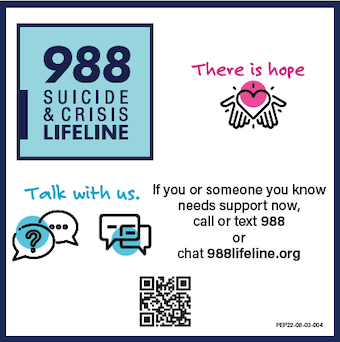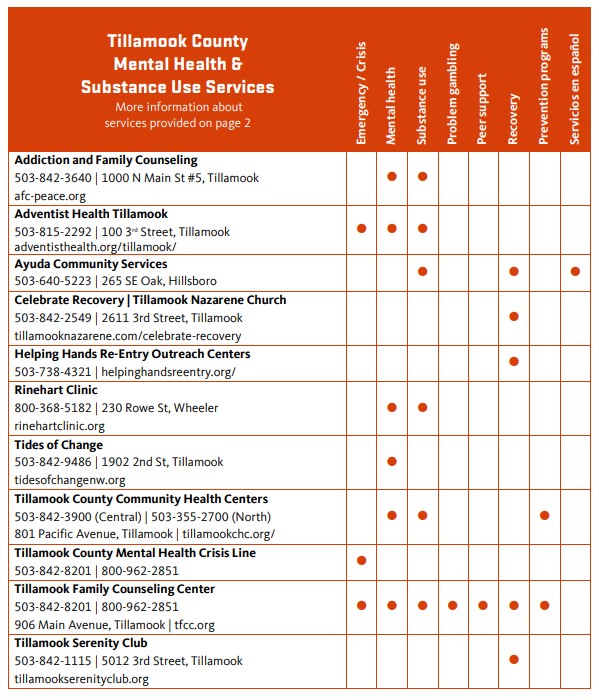EDITOR’S NOTE: How could there be “positive vibes” when discussing suicide? That’s exactly what Jan Boal wants to do. Remove the whispers and the whys and normalize the conversations about suicide and mental health. Join us as we all learn to talk about our mental health and how suicide can be prevented. Jan provides some tips and tools to have these conversations. And if you or someone you know needs resources, see Tillamook County Resources below, call or text to 988.
 By Jan Boal, RN CNN
By Jan Boal, RN CNN
This is not a topic that is easy for most of us to talk about. Unfortunately, suicide has become all too common in our communities across our nation. And yes, WE DO NEED TO TALK ABOUT IT! To change the cultural norms about suicide and normalize the conversations associated with it. Some of which come from religious views, “it is a sin,” “you won’t go to heaven, you will go to hell.” Telling us “it’s selfish, what about the family?,” “ why couldn’t they just suck it up and trudge on like the rest of us?” For those left behind, “Why didn’t they come to us, tell us?” There are layers to why one contemplates to end their life. There are layers of the aftermath that is left with loved ones.
For family and friends who have lost a beloved to suicide there are a multitude of feelings. Shame they all carry. It displays a weakness in the departed. Shame in reasons why this might have happened, bankrupt the family, made very poor choices and not wanting the family to have to live with the humiliation and many more. People speak in whispered tones around the reason why. The cause of death is not mentioned. It is the same with a drug overdose. We don’t feel this way if someone dies of a heart attack due to not taking care of their health. We don’t get mad at them for leaving us for this reason. But having mental health issues is another thing.
We all think, why couldn’t they have come to us to get help!? Why didn’t they find a professional to talk to? The big “why” hangs over us for years. Why didn’t I see it? Why did they feel so hopeless? Why did they think we would be better without them?
I will try to supply you with some answers. Each case is different with so many variables about it. It is heartbreaking. We, the grieving family and friends, feel like we have been robbed, abandoned, becoming an amputee by losing a part of us. So did the departed. Robbed of a happy life, upbringing, social justice, healthy emotions to name a few. For them it is like living in a state of constant grief and pain. Constant hopelessness, despair, numb, a life without joy. Even if they have everything one could want, the brain chemistry plays a huge part. Most do not want to die. They just do not want to wake up one more day to this lifelessness, no hope of getting better, of not having joy, something to look forward to. Imagine how you feel when you are in grief.
Imagine every day for years filled with that. It’s difficult to even breath.
Society has many unrealistic expectations put upon us. For centuries men were told to not cry, feel, express or talk about their emotions. Ethnic and cultural views have their own challenges and taboos of discussing such things. As the saying goes, how’s that working!!? Processing is an important aspect of dealing with life’s challenges. It is a coping tool. How can you build a house with out a hammer? How can you go through life not being able to process without support? Women talk more with each other because it helps, we support one another, we are a sounding board, we give our input.
This helps tremendously. I’m not saying men should gather for group hug therapy (though I do really think it would be great!) but to learn to verbalize their thoughts and feelings. It does lighten the load. You will feel better! Sometimes more help is needed than just this though.
 Here is a list of common causes of suicidal feelings. The first two are the leading causes in having these feelings.
Here is a list of common causes of suicidal feelings. The first two are the leading causes in having these feelings.
#1. Mental health issues not being addressed; depression, PTSD, Bipolar..
#2. Socioeconomic disadvantage. Poverty is continuous stress and despair.
Bullying, discrimination – racism, gender identity, sexual preference…
Difficult types of abuse – domestic, sexual, physical, emotional..
Bereavement – loss of a loved one, the end of a relationship..
Long term illness or pain
Criminal/legal problems
Impulsive or aggressive tendencies
Current or prior history of adverse childhood experience, trauma…
The highest rate of suicide among genders is men. The highest rate in age groups is among adults over the age of 45, especially over 60. Though teenagers have so much more on their plates than they ever have. Not having the coping skills, life experience or the mature frontal lobe development is a delicate and risky situation. They see it as never getting better as they have no mature experience of seeing that things change, we do get through the hard times.
Several warning signs of suicide. When someone is…
- Talking about feeling trapped or in unbearable pain.
- Talking about being a burden to others.
- Showing an increase in alcohol or drug use.
- Is acting anxious or agitated, behavior is reckless.
- Sleeping too little or too much.
- Withdrawing or feeling isolated.
- Showing rage or talking about seeking revenge.
We have to become comfortable with asking “are you okay?” Expressing our feelings, “I am worried about you.” “Can we talk?” And the VERY BIG question that 99% of the population is very uncomfortable with, “Are you having thoughts of wanting to die or not wanting to wake up?” “Are you having suicidal thoughts?” These questions WILL NOT put ideas into their heads. It actually provides relief. It opens the door to a conversation about it. It is a heavy burden to have these thoughts going on inside of us, feeling so hopeless.
Major Protective Factors for Suicide –
– Effective behavioral/mental health care.
– Connectedness to individuals, family and/or community.
– Coping skills, ability to adapt to change.
– Self esteem and a sense of purpose or meaning in life.
To help one another, there needs to be social awareness. Learning to talk about this uncomfortable topic. Reducing stigma’s and ambiguity, by bringing attention to suicide statistically to the forefront. To encouraging positive dialogue and engagement as a means to prevent suicide. We can do this…together.
Positive Vibes Holistic Care
janboal.com



